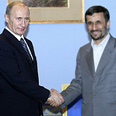
Strengthening ties? Putin and Ahmadinejad in Tehran
צילום: איי אף פי
Before it's too late
Olmert expected to tell Putin Israel will not accept nuclear Iran, will weigh all options to remove such threat
The prime minister will enter the Kremlin Thursday with an unequivocal message to the Russian President: Under circumstances whereby Iran possesses a nuclear weapon, while Russia supplies Syria with advanced weaponry, Israel will be forced to weigh its options vis-à-vis such threats.
The issues of key concern to the prime minister that are expected to be raised at the meeting in Moscow, primarily pertain to Russia's involvement in building Iran's nuclear project. Senior Russian officials are trying to convince their Israeli counterparts that the Iranian nuclear project is under tight Russian control. Vladimir Putin even announced in the past that nuclear weapons in Iranian hands would also endanger his own country and he hinted to Ehud Olmert that Russia would not supply Iran oil that would enable it to manufacture such weapons.
Moreover, Putin has often reiterated that he has a special commitment towards more than a million immigrants who came to Israel from the former USSR, and would not do anything to put them in harm's way. Israel, Olmert is expected to tell Putin Thursday, that Israel will not accept possession of atomic weapons in Iranian hands – and would weigh all options to eliminate such a threat.
It may be assumed that Putin will tell Olmert of his impressions of the meeting he held this week with the Iranian leadership in Tehran. Yet there is no point in expecting that the Russian President will relay any messages from Ahmadinejad to Olmert, since the abyss between Israel and Iran at this stage cannot be bridged.
Another area of concern to Olmert is the new arms deals Russia is about to engage in with Syria, and which are financed by Iran. Among other things Putin intends to provide Assad with ground-to-bair missiles and anti-aircraft missiles that to date he has not sold to any other country.
In an attempt to make Russia aware of the dangerous implication of these arms deals, in recent months Israel presented to the Kremlin evidence that Russian weapons sold to Syria had been transferred to Hizbullah. During the two hours Putin has allocated to the meeting, Olmert also plans to express his objection to Russia's attempt to mediate between the Fatah and Hamas factions with the aim of forming a unity government.
The visit to Moscow was coordinated eight days ago in a telephone conversation between Olmert and Putin. The two leaders agreed to meet after Putin returns from his historic visit to Tehran – the first such visit by a Russian leader since 1943.
The prime minister speaks to the Russian president at least once a month by phone and attributes great importance to the intimate dialog which he believes he has succeeded in creating with Putin. The Russian president is making an effort to show the world that Russia is a super-power, equal to the US; there is barely an international issue where Putin does not demonstrate an independent approach, primarily one that is defiant of the American stance.
"Russia is a key player in the global arena," said a senior source close to the prime minister. "Hence engaging in dialog is of the utmost importance."
The open dialog between Israel's and Russia's leaders is not obvious: Just 20 years ago any random encounter between an Israeli and Russian official in the UN corridors in New York generated giant headlines.
In Israel there is hope that the close ties that currently prevail between the two countries will allow Olmert to convince Putin to consider Israel's fear of an existential threat posed by a nuclear Iran.










